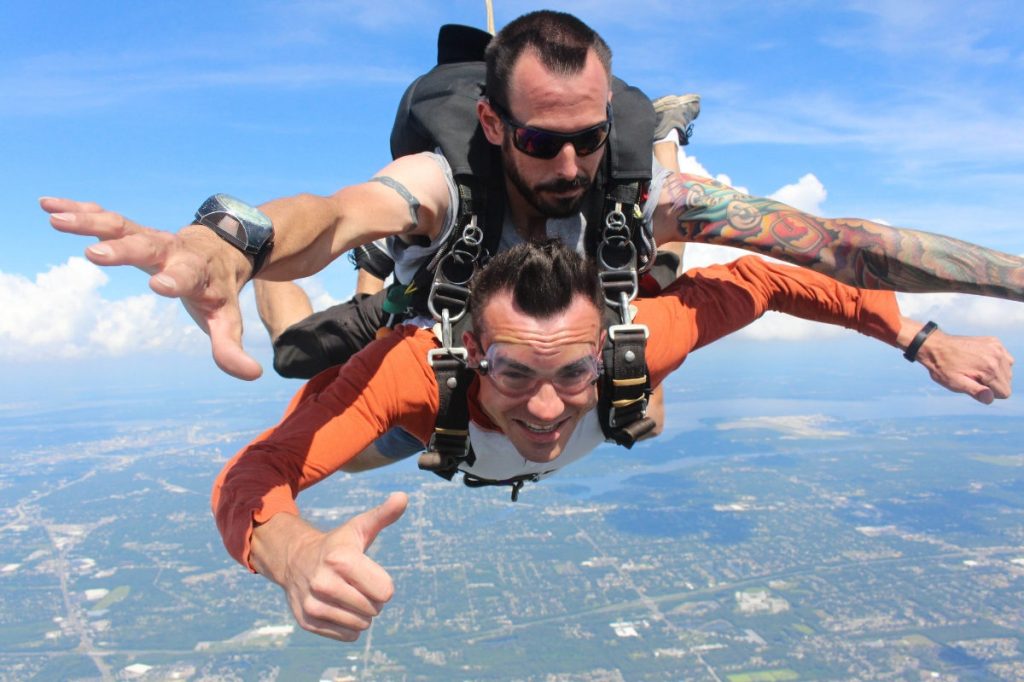by George Salis
The act of writing a novel elicits a series of revelations punctuated by epiphanies. I will share with you two major eureka moments that occurred during the writing of my debut novel Sea Above, Sun Below.
Connected to the myth of Icarus and other vertiginous tales of yore, my novel features a group of skydivers who fall, metaphorically and literally. I’m afraid of heights but I felt like I needed to skydive in the name of research for my novel. As it happens, I loved the surreal experience so much I would do it again. Strapped to my instructor, we waddled to the plane’s open door, and he stood on the edge while I dangled unfathomably high above the earth and with fear I reached out to grip the metal portal, but the instructor gently pried me from even that precarious perch, and then the insensate suck, the slip from everything into nothing, and I realized this was it, that I was truly falling, skydiving, and the wind felt as though the sky wanted to make my mouth and lungs home, palate-scouring, and the seconds were drawn out into a brief infinity, an eternal moment. From there, the world below struggled between a two-dimensional illusion and the reality of three.
Yet, for all that that’s worth, I was fairly surprised to discover, once my feet were on the ground and I was back at my writing desk, that my skydiving description was quite accurate before I had conducted my research and so I ended up adding only a single sentence afterward: “Up here, while the wind became a chorus of tragic furies, the sun detached from the sky, letting the earth revolve like an orrery.” This is one example in which I learned to trust my own instincts, my own imagination. Was skydiving worth the effort, the confronting of fear? Absolutely. Research still has many benefits and can be a delight in and of itself. I should add that while the experience of falling conformed quite uncannily with my predescription, as it were, I did add a plethora of details from my experience within the skydiving hangar, such as the almost anachronistic bowling balls littering the hangar floor which I learned are used to push out air from the parachutes while folding them back into their packs for the next fall. So, aside from personal development, research can give you all those minute details which enhance a fictional scene, but if you cannot afford to go to Japan, for example, then you should rest easy knowing that you have the power to evoke your own germane version of the country.
Also, do not underestimate academic research, which is often less expensive and no less simmering with potential details, for one’s picture of a place or person will always be incomplete and eventually all that’s left for you to do is continue writing.
Mentally juggling and tallying the oftentimes ambiguous constituents of a novel in one’s head, even with the aid of notes and miscellaneous marginalia, can cause a daunting dizziness. To lessen the vertigo, I offer this lesson: I learned that it’s much more manageable to write each chapter as a short story (with chronology being far from a priority). There are certain aspects the short story is known for, yet there is no reason such aspects should be exclusive to it: an ensorcelling first sentence; a strategic entrance into the very story of the story; a self-containment that can feel like a certain tightness, which is not to suggest that you should avoid digressions (they can be, as Ray Bradbury said in defiance of Shakespeare’s Polonius, the soul of wit); an immediacy of image or action or development; and it allows you to weave your novel as if it were a tapestry, depending on the type of novel you are writing. I’m enamored with stories within stories, stories besides stories, in the vein of The Thousand and One Nights or Cloud Atlas, so my novel contains around ten different threads which were written with the mentality, the focused lens, of the short story, connected thematically, genetically, and more. An additional benefit to this method/perspective is that while you work on your long project, you might be able to send out some pieces of it for potential publication. Before Sea Above, Sun Below recently came out as a whole through River Boat Books, I was able to publish ten pieces from it, and in a few cases I received edits on the stories which ultimately helped the final vision.
It is worth noting that you should rage against my advice as you see fit. By all means, do the opposite of what I say if it works for you. Or better yet, use your finger to write your novel in the fog on a mirror; spin around quickly ten times before you sit down for the day’s quota; whisper your sentences backward to yourself; write your dreams then dream what you wrote. Who truly knows what will help?
George Salis is the author of Sea Above, Sun Below (River Boat Books). His fiction is featured in The Dark, Black Dandy, Zizzle Literary Magazine, The Sunlight Press, Unreal Magazine, and elsewhere. His criticism has appeared in Isacoustic, Atticus Review, and The Tishman Review, and his science article on the mechanics of natural evil was featured in Skeptic. He is the editor of The Collidescope and is currently working on an encyclopedic novel titled Morphological Echoes. He has taught in Bulgaria, China, and Poland.
